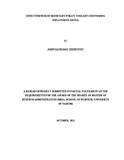| dc.description.abstract | The effect of monetary policy actions affects the general levels of retail prices prevailing in the Country from time to time. Through its monetary policy tools the Government of Kenya is able to control the levels of inflation reported in Kenya. The Central Bank of Kenya (CBK), like most other central banks around the world, is entrusted with the responsibility of formulating and implementing monetary policy directed at achieving and maintaining low inflation as one of its two principal objectives; the other being to maintain a sound market-based financial system. This study set to establish the effectiveness of monetary policy tools in countering inflation in Kenya.
The study employed correlational research design. The study used time series empirical data on the variables to describe and examine the effectiveness of monetary policy tools in countering inflation in Kenya by establishing correlation coefficients between the inflation and the monetary policy tools. The study used secondary data on the Consumer Price Index for inflation, 91-day Treasury bill rate, exchange rate, money supply (M3) and repo rate. The analyses entailed the computation of the various coefficients of correlation denoted as in the model to determine the effectiveness of monetary policy tools in countering inflation in Kenya.
The study established that inflation and the money supply were positively correlate with each other. As money supply circulating around the economy increases inflation also increases. An increase in money supply leads to people spending the excess of their money supply over money demand. The study also established that exchange rate policyhas an important role in reducing or minimizing the risk of fluctuations in exchange rates, which will have an impact on the economy. Any changes in exchange rates will have a great impact on the economy.
The study recommends that the policy makers need to keenly consider the levels of money supply in Kenya so as to ensure a stable retail price levels. The study also recommends that the Government evaluate the prevailing levels of retail prices and set the interest rates on the 91-day Treasury bills because they are majorly treated as risk free rate hence determine other interest rates and inflation levels in Kenya. | en_US |

